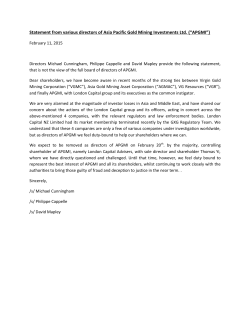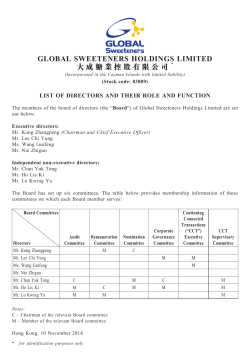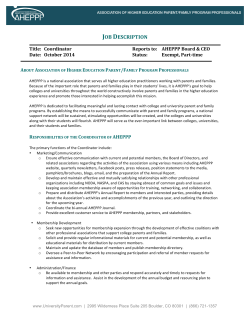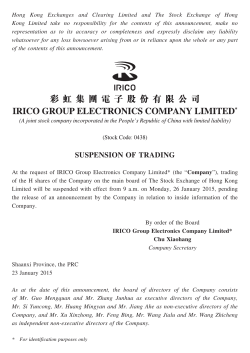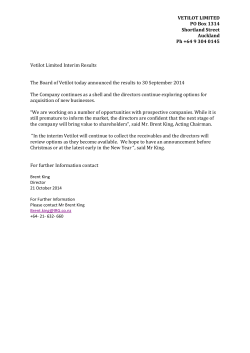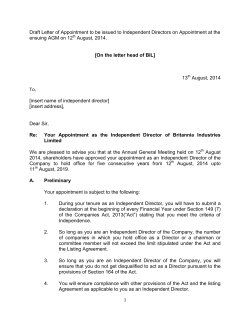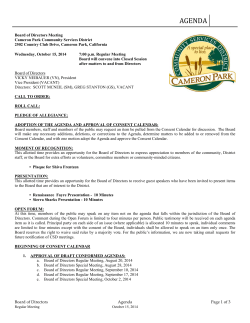
Click here to view the complete PowerPoint
GROWING A HEALTHY FAMILY BUSINESS Family Business Governance Scott E. Friedman Managing Partner, Lippes Mathias Wexler Friedman LLP Founding Principal, Next Gen Advisors, LLC Executive in Residence, University at Buffalo Family Business Institute GROWING A HEALTHY FAMILY BUSINESS “...an active outside board has been the single most important element in [the business owners] effort to reach beyond mere subsistence for enduring excellence.” John Ward, Creating Effective Boards For Private Enterprises GROWING A HEALTHY FAMILY BUSINESS Three Circle Model 2 Ownership 4 7 1 Family Renato Tagiuri and John Davis; 1970s On the positive+ side of business. 6 5 3 Business GROWING A HEALTHY FAMILY BUSINESS “Fight or flight” “Little white lies” Blink! Predictably Irrational Imperfect Memories Selective Attention On the positive+ side of business. “By and large, the idea that our minds are susceptible to systematic errors is now generally accepted.” - Daniel Kahneman GROWING A HEALTHY FAMILY BUSINESS “Confirmation Bias” We prefer evidence that confirms and supports our existing beliefs, while ignoring information that could challenge or refute them. The value of a board of directors: GROWING A HEALTHY FAMILY BUSINESS Benefit of a Board of Directors - Credibility Decisions backed by a experienced and respected board of directors can provide stakeholders and employees with confidence that decisions are smart, principled and objective. GROWING A HEALTHY FAMILY BUSINESS Benefit of a Board - Accountability “Feet-to-the-fire” accountability regarding business matters and living out the core principles GROWING A HEALTHY FAMILY BUSINESS Benefit of a Board - Relationships Board Members can increases your network of: Potential suppliers Customers Sources of capital Professionals Others who may help the business GROWING A HEALTHY FAMILY BUSINESS Benefit of a Board – Succession Planning An effective board can: Help identify appropriate criteria for a successor, Help the family identify candidates who can fill the criteria Provide interim leadership in the case of an unexpected illness or unexpected death of a family business leader GROWING A HEALTHY FAMILY BUSINESS Benefit of a Board - Dispute Resolution The Board can serve an important role in mediating continuing disagreements between family members GROWING A HEALTHY FAMILY BUSINESS Other Benefits of a Board - Subject Matter 1. Strategic planning. 2. Monitor performance of company, CEO to assure competent management 3. Consider major decisions (mergers, acquisitions, new business lines, financing, etc.) 4. Approve budget and related capital decisions (including dividends) 5. Review and approve compensation of senior management. 6. Approve authority level of CEO. 7. Approve succession planning and, ultimately, appointment of successor. 8. Approve intergenerational transfer plan (e.g. retirement plan and estate plan). GROWING A HEALTHY FAMILY BUSINESS Other “Intangible” Benefits of a Board 1. 2. 3. 4. 5. 6. Challenge leadership to “do even better.” Empathetic advisor. Different perspectives can provide unique insights. Stabilizing influence. Can help educate stakeholders. A symbol of a new era of “professionalism” in the business. GROWING A HEALTHY FAMILY BUSINESS Best Practice: Selection Criteria - General Boards should be built around the specific needs of the family business (e.g. high tech, international, manufacturing, etc.). GROWING A HEALTHY FAMILY BUSINESS Best Practice: Selecting Directors - Do’s 1. The best candidates for your board are from larger private businesses that have surmounted the hurdles that face your business. They can help prevent you from making mistakes that they may have made or learned about. 2. Age: a balance of age (between 40 and 65) can lend freshness, perspective, continuity, etc. 3. Gender: depending on constituency of shareholders, diversity can be helpful (but be careful about creating a board with loyalties to individual stakeholders!). 4. Experience: cover crucial areas of needed expertise (but complement, don’t duplicate). 5. Facilitator: consider how board members will interact and if one or more members will have the personality to help “facilitate” board meetings. GROWING A HEALTHY FAMILY BUSINESS Best Practice: Selecting Directors - Don’ts! The following candidates should generally be avoided: 1. Competitors or potential competitors. 2. Friends. 3. Retired businessmen (may “lose touch” with current reality and board status may become too important and, so, jeopardize honest feedback). 4. Academics and people from Non-for-Profits. 5. People who are too busy to devote time that is necessary. GROWING A HEALTHY FAMILY BUSINESS “Vetoing Board Selections” When establishing the board of directors, key stakeholders should be comfortable with all prospective board members. If a key stakeholder is not comfortable with the candidate, the candidate should be rejected. This helps insure that the new board begins on a positive footing. The board, however, should not be established to insure that individual constituencies are represented. An outside facilitator can be useful in ensuring that the selection process goes smoothly. GROWING A HEALTHY FAMILY BUSINESS Best Practice: Size of the Board Rules of thumb: 1. 3 - 5 directors for most family businesses; 2. 5 - 9 directors for larger, more complex, businesses. [there are no fixed rules] GROWING A HEALTHY FAMILY BUSINESS Best Practice: Frequency of Meetings Generally depends of the needs of the business. At least quarterly meetings are recommended. GROWING A HEALTHY FAMILY BUSINESS Best Practice: Where to Hold Board Meetings Board Meetings should be held away from the business premises to avoid interruptions. GROWING A HEALTHY FAMILY BUSINESS Best Practice: Committees of the Board Larger businesses should consider forming committees, including: Audit committee: review outside auditor’s report. Executive committee: officer compensation, executing legal documents, etc. Nominating committee: recommend candidates to fill board vacancies. Planning committee: review mission statement and develop strategic plans to pursue mission. GROWING A HEALTHY FAMILY BUSINESS Best Practice: Directors’ Fees There are no fixed rules. It is generally accepted that some fees should be paid to acknowledge a director’s contribution. Typical fees are between $500 - $2,000 per meeting, plus expenses for attending meetings. GROWING A HEALTHY FAMILY BUSINESS Best Practices - Miscellaneous Include up to three nonfamily members Quorum for decision making (50%) with majority vote Board members should recuse from vote on a matter which he/she is particularly interested in Term limits for family businesses who are just getting started with a board GROWING A HEALTHY FAMILY BUSINESS Myths about Boards Myth 1: Outside directors usurp control. Fact: Outside directors serve at the pleasure of the shareholders and can be replaced at will. Myth 2: Outsiders can’t be trusted with private family information. Fact: Professional management requires some disclosure. Start the “disclosure process slowly, with directors of high integrity, and gain confidence in the process. Myth 3: Outsiders will be unable to understand my business. Fact: Different perspectives can be an asset, not a liability. Experience is always valuable. Myth 4: Outside directors will create more “red tape” and slow down operations. Fact: Directors should not interfere with operations but, instead, on long term strategic planning. GROWING A HEALTHY FAMILY BUSINESS Tips to Make Boards More Effective 1. Define board’s functions and authority; 2. Share your business problems; 3. Prepare for board meetings using agendas, handouts, etc.; 4. Agree on action plans and timetables to implement decisions reached at board meetings; 5. Encourage board members to challenge the CEO, not simply be “yes” men; 6. Encourage probing questions: (how would decision mesh with our strategic plan; is company meeting its potential? If not, why not? How can we take advantage of this problem to create an opportunity? Etc.?) 7. Disclose potential conflicts of interest and abstain from votes, where necessary; 8. Offer suggestions, not edicts. 9. Welcome board assistance as a great opportunity, not as a “necessary evil.” GROWING A HEALTHY FAMILY BUSINESS Board of Directors vs. Board of Advisors Legally required to function in accordance with formal bylaws Far less formal – typically meet whenever requested to do so by the CEO GROWING A HEALTHY FAMILY BUSINESS Board of Directors vs. Board of Advisors Authority Organized and functions according to laws of the jurisdiction in which the business is organized Neither required nor governed by law – state law does not require advisory boards that are established at the discretion of a company’s leaders; CEO has power to choose/replace/terminate advisory board members w/o shareholder or member approval GROWING A HEALTHY FAMILY BUSINESS Board of Directors vs. Board of Advisors Fiduciary Duties Board members owe fiduciary duties to the company and its shareholders No fiduciary duties Can more comfortably focus on serving the CEO GROWING A HEALTHY FAMILY BUSINESS Board of Directors vs. Board of Advisors Quality of Focus May be more motivated to help a company succeed due to legal obligations to shareholders Are usually compensated financially for their service Receive more info from company and therefore are able to make better decisions Can’t be held liable for the advice they provide Serve without compensation GROWING A HEALTHY FAMILY BUSINESS Board of Directors vs. Board of Advisors Liability Legal duties and responsibilities to the company they serve Directors and officers insurance as protection from personal liability ($$$ for the company) Do not face personal liability for mistakes made while advising the company GROWING A HEALTHY FAMILY BUSINESS Family Council [ Governance for the Family] A forum to ensure that important information is shared, questions are answered and minor disputes are resolved before they become major disputes Membership is open to all adult family members including those who are employed by the business and those who aren’t Spouses of adult members should be included Serves as link to the Board of Directors GROWING A HEALTHY FAMILY BUSINESS Family Council – Common Topics Work/family balance Uniform guidelines for employment of family members Pros/cons of employing spouses in the business Family compensation policies Policies, issues and decisions that will affect the family Merits of requiring family members to enter into prenuptial agreements Succession planning, retirement planning, financial planning and estate planning GROWING A HEALTHY FAMILY BUSINESS Family Constitution A formal arrangement of important family documents to include: Statement of values Mission and vision statements Core policies Code of conduct GROWING A HEALTHY FAMILY BUSINESS Getting Started: The “Board Notebook” An introduction to the Family Business in order to help directors “get oriented” and prepared for meetings. Consider including information on the following: 1. Business history and strategy; 2. Industry overview; 3. Ownership chart; 4. Organizational chart; 5. Biographies of key players; 6. Business Plan/Strategic Plan; 7. Summary of vendors, competitors, customers, etc. 8. Key financial information; 9. Budget 10. Estate valuation; 11. Miscellaneous (union info, litigation, real estate, etc.); 12. Key issues facing Board; 13. Board agenda (scheduled meeting dates, key issues, etc.) GROWING A HEALTHY FAMILY BUSINESS Final thought: Effective governance can be defined as creating processes that make revolution unnecessary. “Family Business Governance,” Craig Aronoff & John Ward Scott E. Friedman Managing Partner, Lippes Mathias Wexler Friedman LLP Founding Principal, Next Gen Advisors, LLC Co-Founder and Executive in Residence, University at Buffalo Family Business Institute 665 Main Street, Suite 300 Buffalo, NY 14203 (716) 853-5100 Sfriedman@Lippes.com
© Copyright 2025
